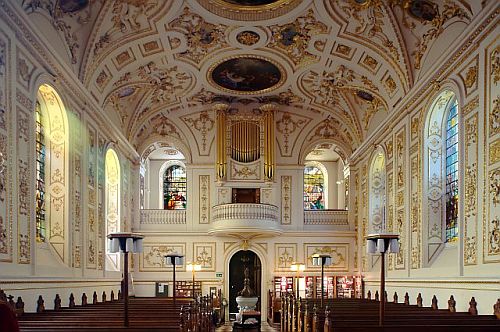 United Kingdom Three Choirs Festival (11) – Haydn: The Seven Last Words from the Cross: The Fitzwilliam Quartet [Lucy Russell (violin), Marcus Barcham-Stephens (violin), Alan George (viola), Heather Tuach (cello)], Peter Atkinson (reader), Great Witley Church, Great Witley, 1.8.2014. (RJ)
United Kingdom Three Choirs Festival (11) – Haydn: The Seven Last Words from the Cross: The Fitzwilliam Quartet [Lucy Russell (violin), Marcus Barcham-Stephens (violin), Alan George (viola), Heather Tuach (cello)], Peter Atkinson (reader), Great Witley Church, Great Witley, 1.8.2014. (RJ)

Although best known in its string quartet version, Haydn’s Seven Last Words from the Cross also appears in three other formats. It was originally commissioned as a set of orchestral interludes to be played Good Friday in Cadiz Cathedral after each of the Words and a brief meditation, but there are versions for fortepiano and for voice and orchestra too.
The Fitzwilliam had clearly given a great deal of thought to the performance. Realising the limitations to playing a series of slow movements on their own. they chose to follow the original Cadiz plan to some extent. Interspersed between the individual sonatas were not only the Last Words but also poems by George Herbert chosen and read by the Dean of Worcester Cathedral, the Very Reverend Peter Atkinson.
After a dramatic musical introduction (Maestoso ed adagio), the words Father forgive them were accompanied by Herbert’s poem The Sinner and followed by an imploring Largo. Verily I say unto you was followed by Herbert’s Love bade me welcome and a Grave e cantabile sequence in which against a measured tread an aria-like melody added a certain poignancy. Behold thy Son, Behold thy Mother was partnered with Herbert’s The Pulley in which God bestows his blessings on mankind; the succeeding Grave movement flowed with warmth and humanity. My God, why hast thou forsaken me was accompanied by Herbert’s rebellious outburst, The Collar, and the succeeding music (Largo) with its dark undercurrents reflected dramatically the air of anguish and desperation.
The tension was relieved for a brief moment to enable the Baroque instruments to be retuned, after which the sequence proceeded with the words I thirst and Herbert’s The Agony which ends appropriately with
Love is that liquor sweet and most divine
Which my God feels as blood; but I as wine.
The following Adagio consisted of a puzzling gentle violin melody with pizzicato accompaniment and more strident passages which seemed to be reflect the situation more accurately. It is finished was coupled with the sonnet Redemption describing mankind’s search for God. The music (Lento) began severely with the strings playing in unison but gradually a feeling of serenity – even joy emerged. Father into thy hands I commend my spirit was juxtaposed with the sonnet Prayer in which Herbert attempts to show mankind’s dynamic relationship with God. and the following Largo underlined the sense of reconciliation and acceptance. This was crowned by some energetic playing by the Fitzwilliam depicting the eartrhquake which occurred ar Christ’s moment of death.
Should one regard an event of this kind as a concert or a form of religious devotion? It is sometimes difficult to know where to draw the line. Suffice it to say that this was a well conceived sequence of words and music which for the most part flowed seamlessly into one another, George Herbert poetry proving very apposite.
But my to my mind the performance was greatly enhanced by the glorious setting. Great Witley Church, some 10 miles north west of Worcester, seems curiously out of place in the heart of England. With gilded decoration, paintings on its walls and ceiling by Antonio Bellucci, windows of painted glass and a monument by the Flemish sculptor Rysbrack its interior is more like the Baroque churches that Haydn was used to in his native Austria The whole afternoon proved to be a wonderful surprise – a stunning marriage between the visual and the musical.
For more information about Great Witley Church see www.greatwitleychurch.org.uk
Roger Jones

Please email me details of the Summer Music Festival in Great Witley Church
many thanks
We are a music review site and sometimes publicize events.
You need to contact the Festival itself.